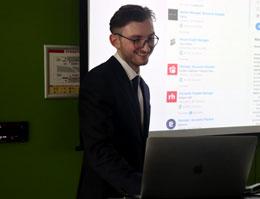AI-powered strategies can supercharge job search

By Xixi Jiang
New Canadian Media
People who want to obtain jobs and Permanent Resident status in Canada can revolutionize their application process by leveraging the power of artificial intelligence, social media and other online tools to become faster, more focused and more successful in their quests.
That’s the message from Max Medyk, a Halifax-based advocate for international students and immigrants who has more than 250,000 followers on YouTube, TikTok, Instagram, and Bilibili.
Medyk captivated an audience of more than 60 at the Halifax Central Library on Sunday, teaching how to use AI to search for jobs, refine resumes, enhance cover letters and generate strategic guidance for immigrants to best navigate the often complex pathways to obtaining Permanent Residency status.
“You don’t need to have paid technical knowledge to operate AI to get you to point B, to get you to jobs, to get you to PR,” Medyk said in his presentation, which he said was the first event of its kind in Canada to teach how to integrate AI into job search and PR applications.
“You can use it as a tool, as a vehicle that you can drive without having a driving license.”
Medyk is an educational influencer and the founder of I’m Canada Media, which works to support newcomers and international students.
Medyk has used ChatGPT since it first became available.
He’s passionate about the power of technology and follows the personal social media accounts of various technological innovators, from tech-firm founders to Silicon Valley researchers.
He also works with immigration lawyers and government to help people to successfully emigrate to Canada.
By working through Nova Scotia’s immigration policies and requirements, he realized that immigrants could proficiently use AI in their pursuit of employment and PR pathways, relieving some of the burden.
“When I spoke with immigrants, most of them told me that their biggest problem is to find a job…and figure out how to emigrate, like which PR pathway to (use),” said Medyk, who is originally from Ukraine, “Some immigrants can’t afford a lawyer, so this (AI) can really help them with that.”
Medyk’s I’m Canada team conducted a survey among newcomers, and more than 58 percent of respondents said they had never used AI for job search and immigration.
Medyk invited a volunteer, Glycia Raposo, to prepare her resume to show how he would revise her resume and produce a cover letter.
Medyk used a PDF reader plugin to get it ready for revisions. Medyk then launched LinkedIn to search for Raposo’s desired job as an accounts receivable manager and found a suitable company.
Copying the job description, Medyk pasted it into ChatGPT, asking it to identify the ideal work experience and skills for the role.
Moving forward, he integrated Raposo’s resume and directed ChatGPT to use a formatted table to meticulously outline the gaps between Raposo’s resume and the potential employer’s required skills and work experiences. The focus then shifted to enhancing Raposo’s accomplishments, as Medyk requested ChatGPT to propose quantifiable metrics for her experience. Medyk then directed ChatGPT to craft an optimal resume for the position, encompassing all prior input and considerations.
Subsequently, he asked ChatGPT to identify the most significant challenges inherent in this role, drawing from the job description provided. Armed with this understanding, he tasked ChatGPT to write a cover letter based on both the job description and the now-identified challenges to explain why Raposo would be uniquely positioned for this job.
For Raposo, the use of AI has the potential to save her from having to work through hours of revisions and writing when looking for a job.
“It was very time-consuming and it’s very stressful because you see the many job positions, you see the skills they require and then you have to make some adjustments to your resume,” Raposo said.









